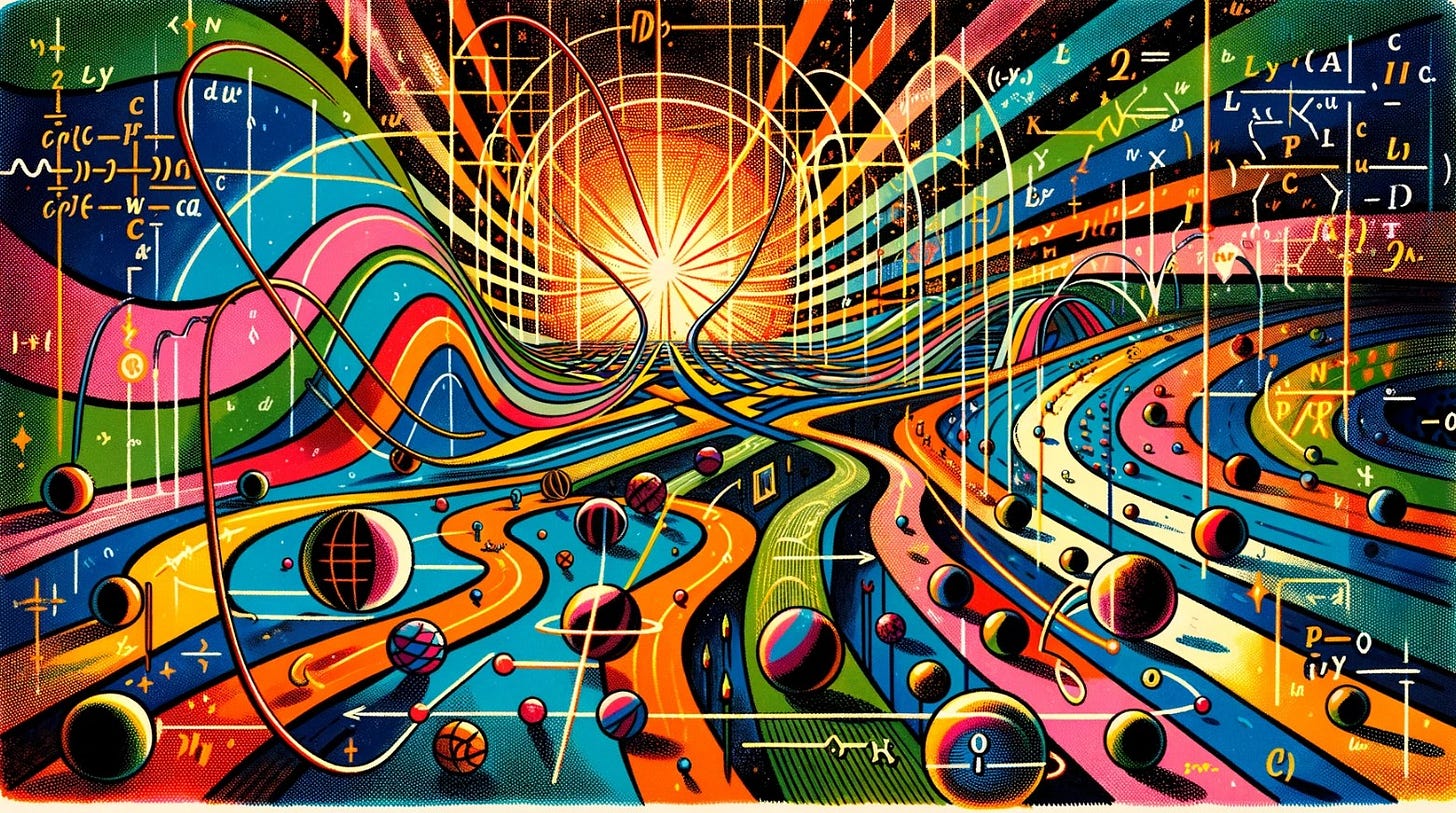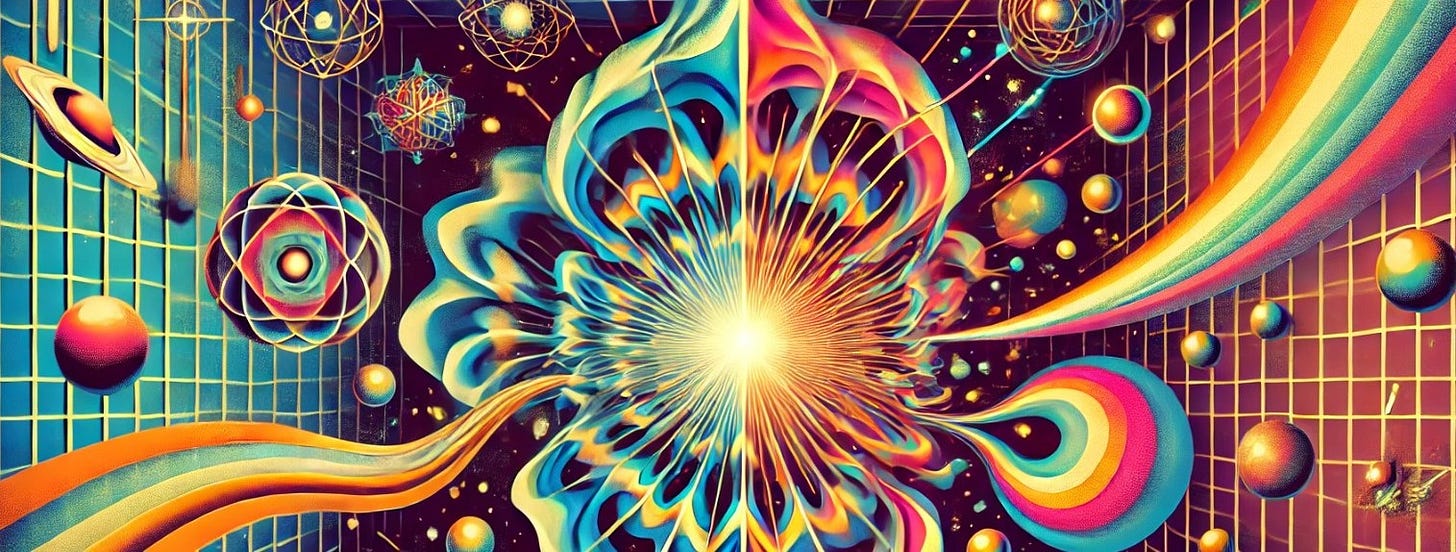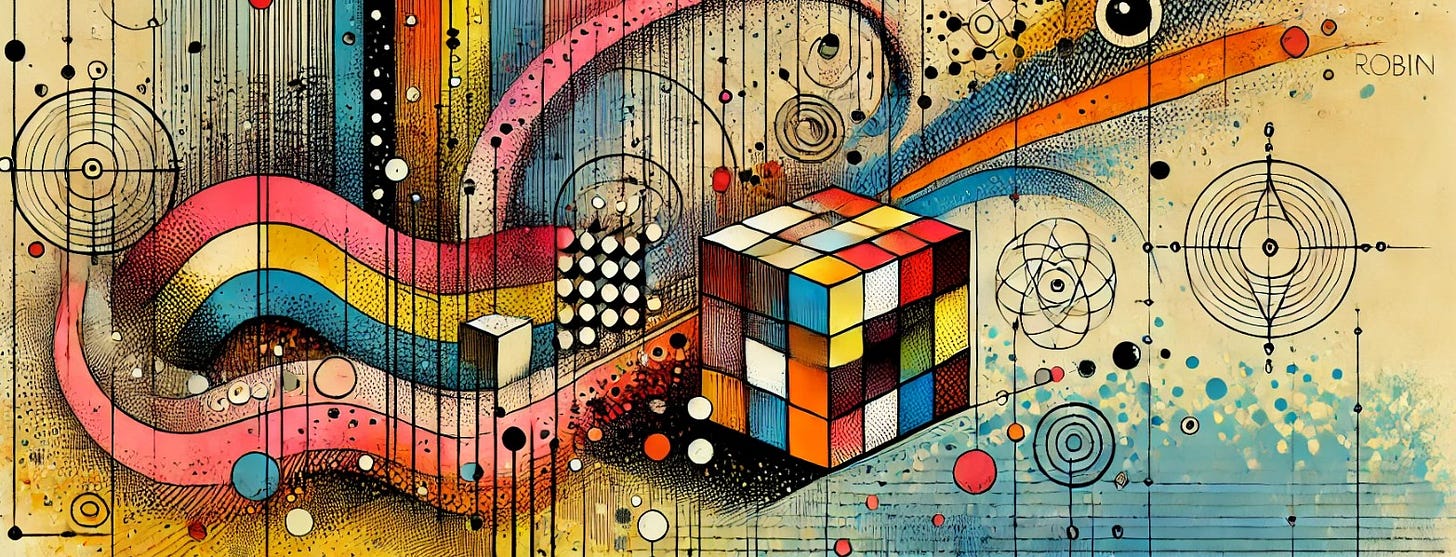The interpretations of quantum mechanics in 5 minutes
How do we “understand” quantum mechanics? What is the wave function exactly? Does consciousness have anything to do with it?
There's two sides to the physics. One is the mathematics (the modelling), and the second is what that math is describing (the metaphysics). We can make that more publishable on the arXiv by using the extremely formal equation:
The model aspect of quantum mechanics has 5 Axioms. The metaphysics, in some sense, can be split into the 5Ws and H. Namely, we have six fundamental questions—Who, What, When, Where, How, and Why.
Feynman wasn't a fan of “why” questions but I'm far more interested in them. Nevertheless, quantum mechanics is physics and physics doesn't have baked in a “why”, so I'm combining it with Axiom Number 5 as that's the natural place for it. Here's a succinct mapping:
The "What": This describes the so-called wave function. (mathematically: represented by a separable complex Hilbert space ℋ, and states are positive, trace-class operators 𝝆 on ℋ with Tr(𝝆) = 1)
The "Where": This tells us where measurement act, defining the properties of the system we can observe. (mathematically: measurements correspond to self-adjoint operators 𝑨 on the Hilbert space ℋ, defining the space where observables act)
The "When": This explains a quantum system changing over time when nothing is measured. (mathematically: the system evolves unitarily between measurements according to the Schrödinger equation, with time evolution governed by 𝑼(𝒕) = exp(-𝒊ℏ⁻¹𝑯𝒕), where 𝑯 is the Hamiltonian and confusingly this 𝑯 is different than the previous ℋ)
The "How": This answers how likely it is that we'll get a particular result from a measurement. (mathematically: the probability of a measurement result in a Borel set 𝑬 is μ𝝆ᴬ(𝑬) = Tr(𝑷ᴬ(𝑬)𝝆), where 𝑷ᴬ(𝑬) is the projection-valued measure for observable 𝑨)
The "Who" and "Why": This describes the act of measurement forcing the system collapse into a definite state. (mathematically: after measurement, the state collapses to 𝑷ᴬ(𝑬)𝝆before𝑷ᴬ(𝑬) / Tr(𝑷ᴬ(𝑬)𝝆before𝑷ᴬ(𝑬)), supposedly reflecting the observer's influence on the system)
Or in summary:
What: Axiom 1 about state.
Where: Axiom 2 about observables.
When: Axiom 3 about evolution.
How: Axiom 4 about probabilities.
Who and Why: Axiom 5 about collapse.
Okay, now let's tackle what the interpretations of quantum mechanics have to say about this...
Copenhagen Interpretation: The most widely accepted interpretation, stating that quantum systems exist in superposition until “observed.” The only remarks it makes that are different in the above axioms is to specify that the “who” that collapses the wave function is any observer. However, it doesn't say what counts as an observer. Your couch can be an observer. (Unfortunately for you, as the couch's memories are now defiled with all you've done there)
Many-Worlds Interpretation: This proposes that all possible outcomes of quantum measurements occur albeit in separate, branching universes, the totality of which is the true big dog Universe. It says that the "who" is no one. There also is no projective dynamics. Or in other words, there is no collapse. It also doesn't dictate the "how" and that's known as the "measure" problem. Not to be confused with the "measurement problem." Physicists love to befuddle newcomers.
Pilot-Wave Theory: This interpretation brings back the good old days of classical physics (well, we had Typhoid fever back then but other than that…). Pilot-wave theory says that the "what" includes not just the wave function, but also definite particle positions. The "when" is all the time, rather than only "between measurements", because particles are always jiggling around, guided by the pilot wave. The "how" is deterministic rather than probabilistic. This means you could predict the future perfectly if you knew everything now. (The only two people who know everything now are the daemon of Laplace, and the ego of Neil deGrasse).
Objective Collapse Theories: Penrose fits here. These theories propose that the "why" of quantum mechanics is also something probabilistic (or spontaneous). Spontaneous isn't exactly the same as random though as in Penrose's theory there's something non-computable occurring, which can't be modelled by probability distributions. In other theories like GRW, collapses is random. For all such objective collapse theories, the collapse occurs more and more the larger the system is. Jenny Craig could equally well say that their job is to make your wave function collapse less frequently. The "who" here depends on the theory. GRW would say that it's no one, and Penrose would also say that consciousness doesn't cause collapse but rather that the collapse produces consciousness.
Relational Quantum Mechanics: This interpretation, put forward by Carlo Rovelli, posits that the "what" of quantum states only has meaning in relation to other physical systems. It argues that there's no absolute state, only relational properties. The "who" in this context can be any physical system. Relational quantum mechanics gives you the ultimate out in a breakup being able to concretely claim, "It's not you, it's me… and also everything else in the universe."
Quantum Bayesianism (QBism): QBism interprets the "what" of quantum states as representing an observer's personal beliefs about future measurements. The "who" in this interpretation is you. The "how" of quantum mechanics is then viewed as a method for updating these beliefs based on new information, aligning quantum theory with Bayesian probability theory. As for how this happens, I spoke to Amanda Gefter about that below. This is the interpretation that most latch onto when they want to turn quantum mechanics into the world's most convoluted self-help book.
Consistent Histories: Why look at single events when you can look at whole histories? This interpretation focuses on the "how" of quantum mechanics by assigning probabilities to entire histories of events rather than individual measurements. The "when" in this view encompasses entire sequences of events. It attempts to provide a realist interpretation without invoking collapse, making the "who" of observation no longer of use. You're obsolete. Elon didn't lay you off, you can blame Griffiths.
Transactional Interpretation: This interpretation brings back the R word like it was the 90s and describes the "how" of quantum events as "transactions" between retarded (forward in time) and advanced (backward in time) waves. The "when" in this view also spans across time though not with "all of time" (unlike the above), with quantum events emerging from these atemporal "transactions." This approach aims to resolve nonlocality issues without invoking faster-than-light signaling, even though your electron texts out "You up?" and gets a "New phone, who dis?" reply from the future.









👏🏾🤜🏾
The key to understanding quantum mechanics is to first understand what gravity is. Gravity is the displacement of an energetic spacetime field (I use a scalar field). Displacement is the only "real" concept that can explain gravity from the particle to the galaxy cluster. Displacement scales up naturally in a 1 to 1 relationship between space and mass. A particle barely displaces the field at all, making gravity seem incredibly weak but as the mass grows so does the displacement which is what we feel as gravitational effects. We can physically see this displacement of the field as gravitational lensing. When quantum particles entangle, they displace the field together forming a unique independent relationship with each other through this shared state between the particles and the energetic scalar field. When the relationship is disturbed the fragile entangled system is broken. https://www.researchgate.net/publication/384676371_Gravity_from_Cosmic_to_Quantum_A_Unified_Displacement_Framework